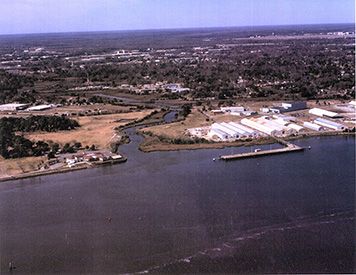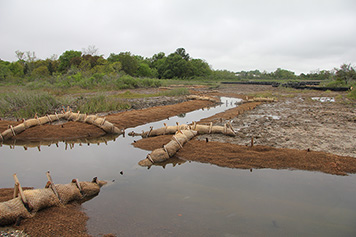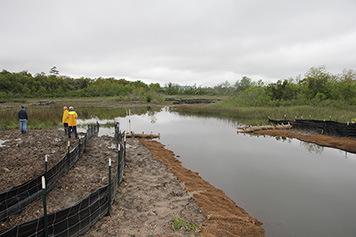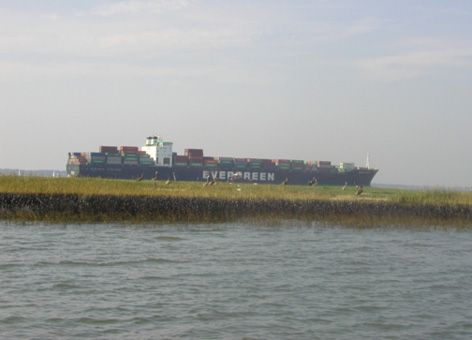The Oil Spill That Helped a South Carolina Community Transform an Abandoned Naval Golf Course Back into a Healthy Coastal Marsh
This Earth Day and every day, NOAA honors our planet by using cutting-edge science to understand Earth's systems and keep its habitats and vital natural resources healthy and resilient. Learn more at http://www.noaa.gov/earthday. APRIL 22, 2013 — Around 100,000 residents call North Charleston, S.C., home, and since 2000, more and more people have been flocking to this urban center that balances the benefits of a lively port city with the rich history and natural beauty of a southern coastal town. Yet this isn't by coincidence. It’s by decision and design. The City of North Charleston actively promotes a prosperous and livable community, which includes restoring green spaces and opening public access to the hard-working waterfront.
This spring, NOAA (through our Damage Assessment, Remediation, and Restoration Program) and our fellow natural resource trustees supported that vision as we restored approximately 12 acres of salt marsh (coastal wetlands) and an additional acre of upland buffer area on Noisette Creek, a tributary of the Cooper River adjacent to the city's scenic Riverfront Park. These efforts were part of a larger restoration plan to address the environmental and recreational impacts from an accidental oil spill in 2002.
Turning an Oil Spill into an Opportunity
At the end of September in 2002, as the container ship M/V Everreach pulled away from North Charleston for its next destination, approximately 12,500 gallons of oil spilled out of it and into the waters of the Cooper River and Charleston Harbor. The oil was seen over some 30 miles of shoreline and sediments, including tidal flats, fringing marshes, intertidal oyster reefs, sandy beaches, and manmade structures (e.g., docks, piers, bulkheads). Most of the oil concentrated in the vicinity of the North Charleston Terminal on the Cooper River and old Navy base piers and docks.
This spill impacted pelicans and shorebirds, closed a shellfish bed operation, and temporarily disrupted recreational shrimp-baiting in local waters. The state and federal agencies charged with preserving the area's public natural resources—NOAA, U.S. Fish and Wildlife Service, South Carolina Department of Health and Environmental Control, and South Carolina Department of Natural Resources—worked cooperatively with the ship's owner, Evergreen International, to determine the resulting environmental injury and resolve legal claims for natural resource damages.

From Marsh to Golf Course and Back Again
After carefully assessing the impacts, we the natural resource trustees worked with North Charleston's property owners, developers, and local officials to restore a marsh-turned-naval golf course back into a functioning wetland that could support birds, fish, invertebrates, and vegetation.

Back in 1901, decades before North Charleston became its own city, the City of Charleston provided riverfront land to the U.S. Navy to develop a naval base. This also involved converting a marsh on the base into a golf course. The former Navy golf course along Noisette Creek in North Charleston was used until the base closed in 1996 and the property was transferred back to the City of North Charleston with a small portion owned by the Noisette Company.
In 2002, the city and Noisette Company began arrangements and planning for the Noisette Preserve, a 135 acre "recreation and nature preserve at the heart of the redevelopment, located around Noisette Creek and its marshes, creeks and inlets" [Final Restoration Plan and Environmental Assessment, PDF].
To increase the tidal exchange and drainage needed to restore this area to a salt marsh, the project required removing a berm in two areas along Noisette Creek and constructing a network of tidal creeks throughout the property, which also provides access for recreational paddlers. Roads, drainage tiles, rip-rap, and other sources of debris were removed during the process as well. As a result, the public will be able to enjoy a beautiful living shoreline which supports the surrounding area's ecological services and ultimately benefits activities like boating, fishing, shellfish harvest, and shrimp baiting.

Supporting Green Communities
In cooperation with Evergreen International, we will monitor the wetland enhancements over the next five years to ensure the project achieves the desired ecological improvements. This project, the first of the planned restoration completed for the Noisette Creek Preserve, has created momentum and excitement for several similar projects slated for this small urban watershed. By aligning these restoration efforts with the larger goals for the City of North Charleston's smart and sustainable growth, we and our partners have been able to build stronger, greener coastal communities and support a thriving local economy—a success for both the environment and the people of North Charleston.
 An official website of the United States government.
An official website of the United States government. 
